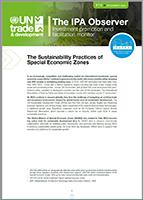
In an increasingly competitive and challenging market for international investment, special economic zones (SEZs) continue to grow across the world, with more countries either adopting new SEZ models or revitalizing existing ones.
As SEZs continue to expand globally, they face the challenge of navigating an evolving trade and investment environment, shaped by global trends such as sustainable development.
The Global Alliance of Special Economic Zones (GASEZ) was created to help SEZs become key policy tools for sustainable development. GASEZ aims to enhance cross-border collaboration, advocate for enabling policy frameworks, and promote peer-learning among SEZs to advance sustainability-related goals. As more SEZs are developed, GASEZ aims to support their evolution into platforms for sustainable growth.
One key initiative is the SDG Model Zone Partners, launched by GASEZ, which identified 50 SEZs working to enhance their contributions to sustainable development. These zones were selected based on their commitments to the criteria from UNCTAD’s 2019 World Investment Report, namely; attracting SDG-relevant investments, upholding high environmental, social, and governance (ESG) standards, and promoting inclusive growth through linkages.
The initiative ensures representation across different regions and levels of development, including Least Developed Countries. In September 2024, GASEZ launched a new call for applications to expand the initiative.
This note summarizes the main findings from a recent survey of the 50 SEZs which reveals insights into their sustainability practices. The results were presented at the 3rd Annual GASEZ Conference in Xiamen, China. Of the 50 zones, 42 (84 per cent) participated in the survey. The survey, along with ongoing stakeholder feedback and dialogue, supports GASEZ’s mission of raising awareness and guiding SEZs toward sustainable development.
SEZs are expanding their focus beyond traditional economic goals and include sustainability objectives, often in line with country-level sustainable development plans, including net-zero goals and nationally determined contributions (NDCs). The most cited sustainability objectives by respondents include promoting urban and environmental sustainability, adopting circular economy models, fostering education and innovation, and promoting diversity and inclusion.


